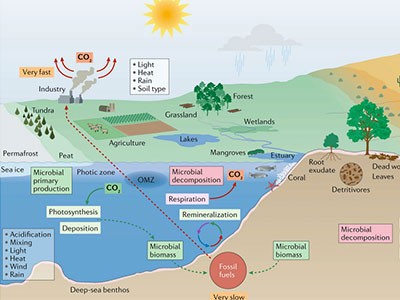
Microorganisms can facilitate the increased release of greenhouse gases from thawing permafrost.Credit: Josh Haner/New York Times/Redux/eyevine
In 1992, the Union of Concerned Scientists in Washington DC, and more than 1,700 researchers, issued the World Scientists’ Warning to Humanity. It cautioned that humans were inflicting “harsh and often irreversible damage” on the environment, and that current practices were endangering humanity’s future. More than 21,000 scientists have so far endorsed a widely publicized and equally stark second warning, issued in 2017.
This week, part of the Scientists’ Warning movement calls attention to a factor that has been largely ignored: microbes. In a Consensus Statement published in Nature Reviews Microbiology, 33 leading microbiologists from around the world “put humanity on notice” that the impact of climate change will depend heavily on the response of microorganisms (R. Cavicchioli et al. Nature Rev. Microbiol. https://doi.org/10.1038/s41579-019-0222-5; 2019).
Read the paper: Scientists’ warning to humanity: microorganisms and climate change
The ubiquity and diversity of bacteria, archaea, viruses, fungi and protozoa have been appreciated only in recent decades. Researchers recognize the colossal number (around 1030 total bacteria and archaea) and range of microorganisms, and that they are essential to the food web and the cycling of carbon and other elements. Microorganisms can speed the release of greenhouse gases from thawing permafrost, and climate change increases the spread of infectious diseases that threaten public health and food security.
The Consensus Statement provides for the first time a consolidated global view of the reciprocal effects of microorganisms and climate change. It emphasizes the potential of harnessing microbes to mitigate global warming, for example through their role in biofuel production from constructed wetlands. The group calls for long-term monitoring of microbial activities that are relevant for greenhouse-gas fluxes; this will require dedicated funding and international collaboration.
Microbiologists have been poorly represented in advisory and executive committees that decide on global environmental and public-health policies. Their expertise and advice must be included to help prioritize future actions to mitigate climate change. The statement authors call for microbiology to be integrated into the United Nations Sustainable Development Goals. (Only one, on good health, explicitly lists microorganisms in its targets and indicators.) As the most abundant organisms on the planet, it’s time that microbes were given more prominence.

 Read the paper: Scientists’ warning to humanity: microorganisms and climate change
Read the paper: Scientists’ warning to humanity: microorganisms and climate change





